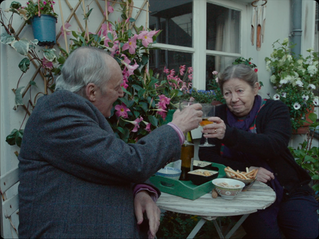Cold War
- Michelle Bernstein
- May 19, 2022
- 3 min read
Paweł Pawlikowski, 2018

When I think of Cold War, the first thing that comes to my mind is the opening scene – the children of war, the people with fragments of their history in a folk song-shaped memory.
In the first shots, we are introduced to the loud serenading of a bagpipe-like instrument – a man with rheumy sad eyes; a violinist’s sharp cheeks; chickens pecking around their house. A small boy in a thick coat and a flapped ushanka stands still listening and observing. These first sounds and images reflect upon the entire film, surpassing the state of displacement and a certain longing for simpleness. What once was and will never be again. The contrasting images of everyday life, landscapes of post-war Poland are delicate and naturalistic – they can be easily compared to the works of Andrei Tarkovsky.
While the film tells a magnificent love story, it is also a film about belonging, the emotional odyssey and the physical pilgrimages we find ourselves enduring. Cold War is above all else an account of the dimensions of love in position to time and space. How love moves through us and along with us as we go through life in a metaphorical and physical nature. It is like wandering into the past — like looking into someone’s recollections.
However, here, representations and definitions of things – such as time and remembrances – function in layers. The central characters, Zula and Wiktor, are constantly travelling back and forth, both in an emotional and a literal context. They cannot seem to find an agreement where they can love one another and be in each other's day to day life as well as fulfil their artistic duties.
The film dances its way through different time frames, some components being more precise and focused, others almost gone with a glimpse, as if they’ve already been partially forgotten. Occasionally it feels so personal and precisely intimate, like witnessing something you shouldn’t see because these moments belong to someone else.
I feel I must write about the editing since it serves a significant role in how we perceive the way time passes, and the relationship the characters sail – it is, therefore, another facet that contributes to the layered perception of time and voyage. The editing is rather sudden and sporadic. One second you are witnessing the mundanity of the Polish countryside, the next you observe an event in an opera house. Instead of being spoon-fed the plot, one is put in a position to make the ties between time and place and its in-between on their own.
Through Cold War, Pawlikowski preserves a version of his own parents’ volatile relationship; the film is also dedicated to them. His parents met in 1948. His mother was a ballerina, his father was studying to be a doctor – they were repeatedly divided and reunited. They divorced only to reunite years later in Germany when both were married to other people, so they divorced their respective spouses and remarried. Both died in 1989, just before the Berlin Wall came down. When his parents died Pawlikowski felt a huge absence in his life, the absence of a “fatherland and motherland,” as he explained it.
In his film, Pawlikowski does not only preserve a fictional version of his parents, but also the stories of people who fell into the emotional turmoil, the web that was the circumstances artists faced during the Cold War. It is also about the hardships people faced to preserve the history and culture, the music and art, after the Second World War.
In the film, Wiktor's and Zula's story unfolds over just fifteen years. As the folk company expands and receives more attention, Wiktor becomes worried about the government’s measures to supervise the content of its music and concerts. The couple plans on fleeing to the West, to Paris through Berlin, which at the time was still an open city. Once again, the two are divided, then reunited, then separated again. Periodically for geopolitical reasons and occasionally for deeply emotional ones. They move along the ever-turning landscapes of the times of the Cold War – bearing both a connotation of geographic and spiritual passage.
The history and culture that are portrayed in this film lie close to my heart. The language of the protagonists is the first I ever knew. I know the cold of Berlin during the winter, the painted cheeks of the Mazurek dancers, those desolated timeless folk songs, as weathered as worn linen. It all feels familiar, yet out of reach. Like a word on the tip of your tongue or something you are reaching for with your hands stretched tightly and can barely reach.








Comments